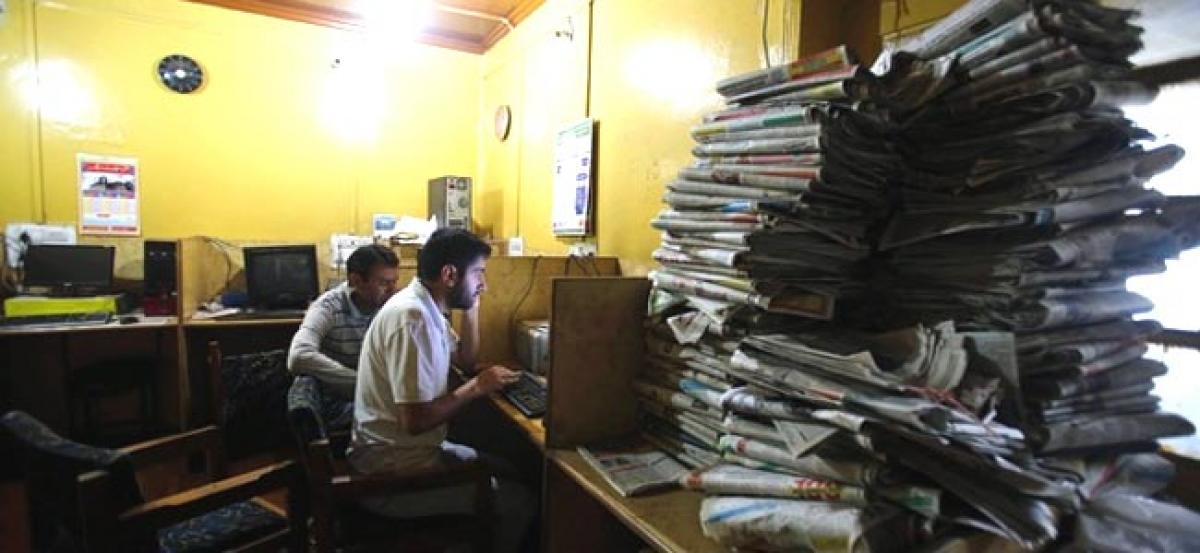Live
- CCI issues cease and desist order against Table Tennis Federation of India, affiliate bodies
- Sensex closes at 82,133 after 2,000 pts rally from day low
- SMAT: Rahane’s stellar 98 leads Mumbai to final
- PKL 11: 'No one can predict who will reach the playoffs,’ says UP Yoddhas coach
- Nobody praises Kejriwal's ten-year tenure: Sandeep Dikshit
- MacBook Air M3 Hits Lowest Price in India: Find Details
- High Court Adjourns Hearing on Allu Arjun's Petition to 4 PM
- Pawan Kalyan praises Chandrababu Naidu at Swarnandhra Vision 2047 document launch
- Chirec International looks to transform education with Chirec 2.0 vision
- Telangana CM Revanth Reddy Responds to Allu Arjun's Arrest in Delhi
Just In

When a senior cabinet minister and government spokesperson in no ambiguous terms tells editors of Srinagar-based dailies to shut, the decision to gag the media amid heightened security restrictions in the Kashmir Valley cannot be \"local\".
Srinagar: When a senior cabinet minister and government spokesperson in no ambiguous terms tells editors of Srinagar-based dailies to shut, the decision to gag the media amid heightened security restrictions in the Kashmir Valley cannot be "local".
The minister, Naeem Akhtar -- a former bureaucrat who is the education minister -- had also explained on record why the newspapers were banned from publishing their print editions.
He was quoted by at least two Delhi-based newspapers and an international wire service saying the "reluctant", "undesirable" and "temporary" measure was to avoid "multiplication of tragedies" in the restive Kashmir Valley, facing an unprecedented bloody crisis following the July 8 killing of 22-year-old Hizbul Mujahideen militant commander Burhan Wani.
Akhtar said Kashmir's angry youth "get surcharged due to certain projections in the media", causing more street protests and use of force by security forces -- resulting in a vicious cycle of violence that has left over 40 people dead and nearly 2,000 injured, including over 100 who have been hit by pellets in their eyes and may be partially or fully be blinded for the rest of their lives.
The ban on newspapers included snapping of cable TV -- now resumed -- and stoppage of private cellphone services as the government struggles to control the violent anger on the streets of the valley -- under curfew for the 12th consecutive day on Tuesday.
For the third day in a row on Tuesday, people in the valley did not get newspapers due to the gag, imposed on Saturday morning when police raided all newspaper printing presses and seized copies that had already been printed.
The newspaper ban captured international headlines and the news was widely reported by dailies across the world. For the international media, it became bigger than the bloodiest unrest seen in the valley.
Sources close to Chief Minister Mehbooba Mufti told IANS that "internationalisation of the Kashmir issue" prompted the state government to review the decision. The central government, according to the sources, also rebuked the state government over the media ban.
Mehbooba Mufti on Monday afternoon called a meeting of her close aides and some senior cabinet colleagues, after "she realised the mistake of banning the press and going public about it", said an aide to the chief minister, privy to the meeting.
The source said the ban was earlier imposed after a section of Mehbooba Mufti's cabinet pressed for it and wanted to create an information blackout till the cycle of violence ended and some normality is restored.
"However, they apparently didn't realise that it will widen the issue beyond India's border, giving Pakistan more ammo to invite attention on Kashmir."
Mehbooba Mufti's political advisor Amitabh Mattoo, after the Monday meeting, telephoned almost all the Srinagar-based newspaper editors and publishers, "apologizing" and asking them to resume publications.
On the record, Mattoo said the government had not banned the newspapers and the decision may have been taken by somebody at a "local" level and that the chief minister was not aware of it.
"Even if true, did Mehbooba Mufti come to know about it only on the third day of the ban," asked a newspaper editor here.
"Is this possible? Doesn't she read newspapers regularly? Is it a convincing statement that she was kept in the dark about it?"
The government -- despite Minister Akhtar's public announcements -- has already started punishing people. District police head Fayaz Ahmad Lone of Budgam has been shifted and made the first scapegoat of the crisis.
Two printing presses under Lone's jurisdiction were raided and newspaper copies seized by police on Saturday morning.
On Tuesday, Mehbooba Mufti also informed the central government that there was no "media clampdown" in Kashmir. She spoke with Union Information and Broadcasting Minister Venkaiah Naidu, a day after the issue echoed in the Rajya Sabha.
The government's flip-flop and Mattoo being economical with the truth behind the ban has once again exposed how clueless the state government appears on the method to control the Kashmir crisis or bring some semblance of peace to the valley.
"She appears to have lost control. You cannot fight the crisis with a divided house of your own. Mehbooba is, of course, fighting many challenges and one of them is a deep division in her government," said Fayaz Ahmed Jan, a political science teacher at a Srinagar college.

© 2024 Hyderabad Media House Limited/The Hans India. All rights reserved. Powered by hocalwire.com







